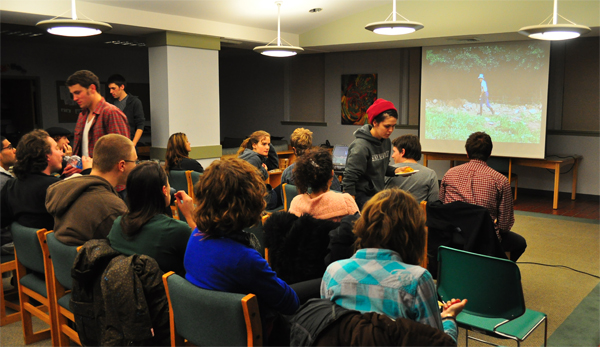

As a means of enlightening students on the benefits of sustainability and consequential dangers of unsustainable methods, Students for Sustainable Agriculture at SUNY New Paltz hosted a screening of “FRESH” in the Honors Center on Tuesday, Nov. 2 at 6:30 p.m.
“FRESH,” directed and produced by Ana Joanes, “celebrates the farmers, thinkers and business people across America who are re-inventing our food system,” according to freshthemovie.com.
One of the film’s opening lines states, “Americans fear only one thing: inconvenience.” What followed were images of a plethora of processed, pre-packaged foods sliding across a supermarket conveyor belt.
It’s oftentimes tough to spend those extra dollars on local and organic groceries, but the point of the documentary is that the money “saved” is still spent somewhere along the way, whether in processing where nutrients are diminished or in exploitation of laborers. The film goes on to state that fresh, healthy food is what we should be subsidizing, rather than high-fructose corn syrup and hydrogenated oils.
A number of sustainability progressives are followed throughout the film, each informing on the methods they’ve chosen by taking part in this movement. In one instance, Ozark Mountain Pork Cooperative President Russ Kremer went “cold turkey” by exterminating his entire herd of antiobiotic-infused hogs after suffering from a mutated infection, unphased by normal antibiotics, from being stabbed by a tusk. After his “conscience kicked in,” Kremer opted to raise an antibiotic-free herd and has for more than 14 years.
“[FRESH] was informative and took a more positive view than other movies of its genre,” said third-year sociology major Ariel Zolla. “I feel it’s worth it to buy the better quality food. I like to shop locally because I like to know where my food comes from.”
Other highlighted activists include urban farmer and MacArthur’s 2008 Genius Award winner Will Allen of Milwaukee, W.I. and sustainable farmer Joel Salatin, who believes in letting chickens keep their “chickenness,” rather than cutting off thier beaks.
Although she had never seen “FRESH” prior to the screening, third-year geography major and club Co-President Angela DeVivo found it to be a good choice, as opposed to films such as “Food, Inc,” because it’s less fear-based, and therefore more productive.
With a number of successful events, a minimum attendance of 20 each week and a contract for 15 percent of the school’s food to come from local suppliers, new leadership is not slowing Students for Sustainable Agriculture down.
“It was extremely daunting and nerve-wracking assuming the position … but working with Angela has been great, and we’ve gotten a lot of support from the former heads,” said second-year environmental studies major Yael Krevsky. “There is this new energy, with fresh faces and a lot of momentum.”
The group has already volunteered at local Brook Farm and Honey Locust Farm, helping to weed, transplant and take care of any other necessary projects.
“A lot of local farms don’t have enough labor,” said DeVivo, who plans on bringing the group to each farm one more time by the semester’s end. She also said she’d like to possibly set up an educational program with Gardiner’s Phillies Bridge Farm Project.
Along with these aspirations, the group is holding to their goals of maintaining and increasing the percentage of local food imported to the school and improving its allotted campus garden, located on field Q (next to the soccer fields behind Esopus).
If you’re interested in helping establish a more sustainable environment for campus and the community, head over to the Students for Sustainable Agriculture meetings on Tuesdays at 7:30 p.m. in the Honors Center.
“It’s important for everyone to know about the food they consume and where it comes from, especially … surrounded by such an active farming community,” Krevsky said. “[Students] should be more involved and aware of sustainable agriculture.”
